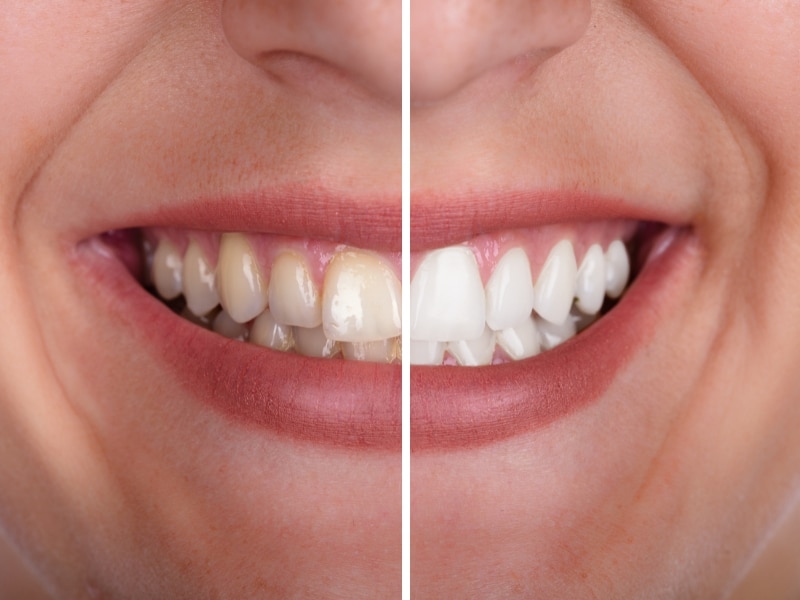Teeth whitening has become a popular way to enhance the appearance of your smile. While it can brighten your teeth and boost your confidence, knowing how often to undergo teeth whitening treatments is crucial. Overdoing it can potentially harm your teeth, while not maintaining a proper schedule may cause your smile to lose its sparkle. In this article, we’ll explore the factors that determine the ideal teeth whitening frequency and how to maintain lasting results.
Why is teeth whitening important for your oral health?
Teeth whitening isn’t just about improving your appearance; it’s also about enhancing your oral health. Over time, teeth can become stained or discoloured due to various factors like food, drinks, and tobacco use. Whitening your teeth can help remove these stains, contributing to a healthier-looking smile. A brighter smile can increase your self-esteem and encourage you to care for your teeth more regularly, including brushing, flossing, and scheduling regular dental check-ups.
What are the benefits of teeth whitening?
Teeth whitening comes with several advantages, both aesthetic and psychological. Here are some key benefits:
- Boosts confidence: A whiter smile can make you feel more confident in social and professional situations.
- Enhanced appearance: Teeth whitening can improve your overall appearance, giving you a youthful and healthy look.
- Motivation for better oral hygiene: People with whiter teeth are more likely to take better care of them.
- Non-invasive treatment: Teeth whitening is a simple, non-surgical way to improve the colour of your teeth.
- Long-lasting results: Professional whitening treatments can provide longer-lasting results compared to at-home options.
What factors affect teeth whitening frequency?
The frequency of teeth whitening depends on several factors. Consider the following before scheduling your next treatment:
- Diet and beverage choices: Foods like curry, coffee, tea, and wine can stain your teeth, requiring more frequent whitening.
- Tobacco use: Smoking or chewing tobacco can affect tooth whiteness, making touch-ups necessary.
- Personal oral hygiene: Consistently brushing and flossing helps prolong whitening results.
- Age: As enamel wears away with age, teeth may stain more quickly and need more frequent whitening.
- Dental health: Address any cavities, gum disease, or other issues before starting whitening treatments.

Can teeth whitening frequency impact tooth sensitivity?
Understanding teeth whitening is essential, as while it can make your smile look brighter, it can also lead to temporary sensitivity in some individuals. Over-whitening can worsen sensitivity, so it’s important to space out treatments. Here’s how whitening frequency affects sensitivity:
- Temporary sensitivity: Mild discomfort, hot or cold, usually subsiding in hours or days.
- Overuse causes permanent sensitivity: Frequent treatments can lead to long-term sensitivity.
- Sensitivity-reducing products: Use products for sensitive teeth or consult your dentist if discomfort occurs
What are the risks of overdoing teeth whitening treatments?
While teeth whitening can significantly improve your smile, it’s possible to overdo it. Overuse of whitening products can lead to several issues:
- Enamel damage: Excessive whitening can weaken tooth enamel, making your teeth more vulnerable to decay and cavities.
- Gum recession: Some whitening treatments, particularly those applied at home, may cause your gums to recede, exposing the more sensitive parts of your teeth.
- Increased sensitivity: As mentioned earlier, overuse of whitening treatments can cause tooth sensitivity, which can become more severe with each treatment.
What signs indicate it’s time for a touch-up in dental whitening?
You may need a touch-up on your teeth whitening when you notice the following signs:
- Yellowing or dullness: If your teeth have started to look yellow or dull again, it may be time for a whitening session.
- Stains from food or drink: After consuming stain-causing foods and beverages, you may notice some discolouration.
- Loss of sparkle: A reduction in the brightness of your smile can indicate that a touch-up is needed.
- Sensitivity: If you experience sudden tooth sensitivity, it could be a sign that your enamel is wearing thin and more frequent treatments are necessary.
- Gum discolouration: In some cases, whitening treatments can cause your gums to look a bit darker, indicating the need for a professional touch-up.

How can you maintain your dental whitening results for longer?
Maintaining your teeth whitening results involves a few simple habits. Here’s how you can keep your smile looking fresh for longer:
- Brush and floss regularly: Brush your teeth twice a day and floss to remove plaque and food particles.
- Avoid staining foods and drinks: Try to minimise consumption of stain-causing foods like coffee, tea, and red wine.
- Use a whitening toothpaste: Consider using a toothpaste designed for whitening to help maintain your bright smile.
- Stay hydrated: Drinking plenty of water can help wash away food particles and prevent staining.
- Organic teeth whitening: To brighten your teeth gently without harsh chemicals, consider safe and effective natural whitening options, such as baking soda or activated charcoal.
- Touch-up treatments: If you’re prone to staining, consider professional whitening touch-ups every 6 to 12 months.
How does dental whitening frequency vary between professional and at-home treatments?
There’s a significant difference between professional teeth whitening treatments and at-home options in terms of frequency and effectiveness:
- Professional whitening: Stronger treatments that last longer, typically needing touch-ups every 6 to 12 months, depending on lifestyle.
- At-home whitening: Milder products that require more frequent use but can lead to increased sensitivity if overused.
- Safety and supervision: For safety, a dentist supervises professional treatments, while at-home options can be riskier if used excessively.
Maintaining your radiant smile
Maintaining a bright, white smile doesn’t have to be complicated. By understanding the factors that affect teeth whitening frequency, you can determine the best schedule for your needs. Whether you choose professional whitening treatments or at-home options, it’s essential to maintain a balanced approach and consult with your dentist if you have any concerns about sensitivity or the effects of over-whitening.
If you’re in Sydney and looking for professional dental care, including teeth whitening services, consider visiting Marsfield Dental Care. We offer a wide range of dental services, ensuring your smile stays bright and healthy. Whether you’re looking for general care, cosmetic treatments, or a simple teeth whitening touch-up, Marsfield Dental Care is here to help. With a family-owned focus, multilingual staff, and positive reviews, you can trust us to provide quality care tailored to your needs. Plus, our convenient location and modern technology ensure a seamless experience. Book an appointment at Marsfield Dental Care today and bring your smile back to life!

